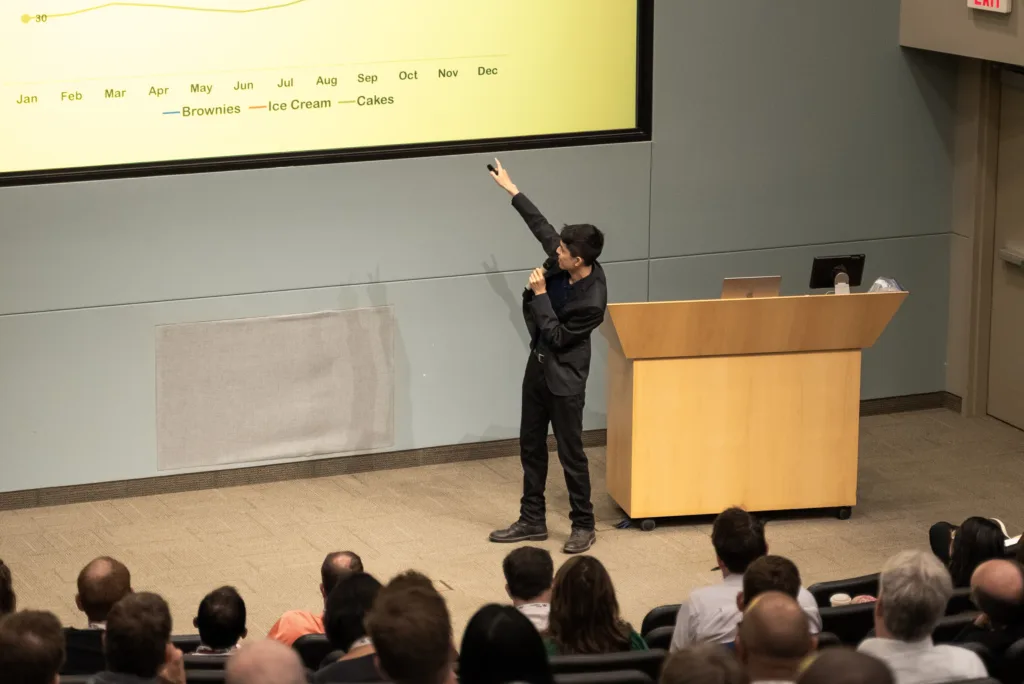“You don’t speak up enough in meetings”
That complaint from my boss used to pain me most. Because I used to have a soft, quiet voice.
- I was hesitant to speak in meetings because I was afraid I wouldn’t be heard
- And I was hesitant to speak in meetings because when I did speak, I frequently got interrupted
If that description resonates with you, you know how frustrating it is for your voice to not be heard – because that means your opportunities to be visible, respected, and above all promoted…are few and far between.
In this article I will overview how to professionally handle interruptions so you can let your voice properly shine in the workplace.
Why Do People Interrupt?
There are a few reasons why people interrupt, many of which don’t come from a malicious place:
1. For some cultures, it is natural to interrupt
Certain cultures see “interruptions” as indications of engagement with the conversation1. It is expected for people to cut in when they have something to add, and more unnatural for participants to “take turns”.
For additional tips on effective cross-cultural communication, read more here.
2. For some people, they are not aware they interrupt
People from a conversational “turn-taking” culture might still interrupt because they aren’t aware of that cultural norm and aren’t aware their behavior is problematic. Their “interruptions” are often simply expressions of excitement with the current topic.
3. For some people, they can’t help but interrupt
Other people from conversational “turn-taking” cultures might have conditions like ADHD, in which case it is harder for them to control the impulse to interrupt when they have something they want to share2
4. For some individuals, they’re just rude
And of course, in certain cases, the person interrupting is trying to assert control over the conversation and not interested in what you have to say.
What Not to Do When You’re Interrupted
The next time you are interrupted, remember that it could be for any of those reasons. While it is tempting to assume the worst, remember this: there have probably been times when you too made a social mistake unintentionally. And during those moments, you wished people would give you the benefit of the doubt.
That’s what you can do for other people. You can give the benefit of the doubt by:
1. Not showing immediate irritation
If you become visibly angry and frustrated, the situation has escalated to a potential argument. In a professional environment, it is important to maintain a professional composure.
2. Not being passive aggressive
Consider this situation. You accidentally interrupt someone. In response, they stare at you, wait for you to stop talking, then say, “As I was saying…” How would that make you feel?
Probably very guilty…and hurt, especially if you weren’t interrupting to be rude.
You would probably prefer that person not be passive aggressive, and instead have a civil, open discourse with you so you can be clear about how to best move forward.
Let’s cover how to achieve that.
Here’s What to Do
What to Do: The First Time You’re Interrupted
Keep talking.
Frequently when we’re interrupted, we just stop talking and let the other person take over the conversation…out of politeness. In a “turn-taking” conversational culture, however, remember the other person is being impolite by jumping in.
You are not the problem.
Instead, act like a leader. Leaders take up space. Because they know what they say deserves to be heard. And they’re not derailed by slight bumps in the road like minor interruptions.
Speak like a leader and people will treat you like one
If someone starts to interrupt you as you’re speaking, keep going and finish your sentence. Then stop, turn to them, and say, “Did you have something to add?”
This does several things:
- It discourages the other person from interrupting you again because they know you won’t be walked over
- Out of courtesy because you did hear something, you then are the one who invites them into the conversation
- By asking what they wanted to add, you assume positive intent – that they weren’t interrupting out of rudeness, but out of excitement to share a new thought
For more information on the relationship between leadership and communication, read more here.
What to Do: The Second Time You’re Interrupted
Now the interruptions are becoming more of a pattern. But you don’t have enough evidence yet to say that definitively. At this stage, still assume positive intent.
If the other person interrupts you, keep talking and finish your sentence as before. If they continue talking over you, that’s where you slightly escalate. You can use phrases like:
- “Hang on a sec, let me finish this”
- “Hold on, you’ll like this next part”
- “Wait, let me just wrap up this idea”
- “I’ll finish what I was saying then I want to hear you tell me about [X]”
After you use one of those phrases, keep going. Don’t let them in until you’ve finished what you wanted to say.
Caveat
In cultures where this assertive approach is considered aggressive, especially when speaking to leaders in senior positions, you can soften your stance by turning these phrases into questions such as:
- “Do you mind if I finish what I was saying first?”
- “Oh I wasn’t done yet. Would you let me finish what I was saying before?”
- “Would you let me finish this first? I’d love to hear what you have to say after”
Then you can continue from where you left off once they give you nonverbal or verbal acknowledgment to do so.
No matter what culture you’re a part of, I want to highlight the importance of tone. If you say “Hang on a sec, let me finish this” in an annoyed tone or “Do you mind if I finish what I was saying first” passive aggressively, the tension instantly rises in the room and any goodwill in the conversation is lost.
On the other hand, if you say those phrases in a polite, respectful, yet assertive tone, the other person will be more likely to recognize their role in interrupting you and be more than happy to let you continue.
What to Do: The Third Time You’re Interrupted
Now it’s highly likely interruptions are a habitual part of the other person’s behavior. Here’s how you address it in a professional way.
You can continue the same recommended patterns as before:
- Continue talking to finish your sentence
- If they keep talking, say phrases like “Hang on a sec, let me finish this” to re-direct their attention back to you
If they still continue talking, you can raise the ante by repeating your previous phrase (like “Hang on a sec, let me finish this”) and adding:
- A raised hand in a stop-like gesture to indicate you would like them to start listening
- Their name before you use the re-directing phrase, for ex: “[Name], hang on a sec, let me finish this” (Saying their name is one of the quickest ways to get their attention)
If they keep talking over you beyond this point (which would be extremely unlikely), the conversation is not a conversation. It’s just a monologue.
If your work culture allows, you can give a polite warning like “[Name], if you continue to interrupt, I will have to end the conversation”.
Then follow through. Excuse yourself from the conversation and follow-up with the other person in a private conversation. Address how their behavior affected you in that specific situation and what actions can be taken so that you both feel respected in the future.
In this article, we covered how to respond when you’re interrupted. For tips on how you can interrupt others in a professional and respectful way in the workplace, read more here.
Summary
Interruptions are often an uncomfortable and inevitable part of conversations at work. But you have the power to be a leader and hold your conversational space:
1. Not all interruptions come from malicious intent. Some are motivated by cultural background, lack of awareness, and conditions like ADHD leading to difficulty controlling impulses. The professional approach I recommend is giving the benefit of the doubt.
2. What you shouldn’t do is become immediately irritable or passive aggressive. Handling interruptions like a leader is about maintaining your composure in difficult situations.
3. When an interruption occurs:
– Aim to finish your sentence. Then invite them into the conversation
– If they continue to speak, you can use re-directing phrases like “Hang on a sec, let me finish this” to bring the attention back to you
– Even consider adding their name explicitly or body language like a raised hand to further highlight the priority of your conversational turn
– If all still doesn’t work at this point, consider leaving the conversation. Because it isn’t one. And follow-up with the other person privately to address their behavior.
If you’re looking for further guidance on how to differentiate your communication skills and stand out in the workplace, reach out to me here.
Sources
2 National Library of Medicine, “Experiences of criticism in adults with ADHD: A qualitative study”



